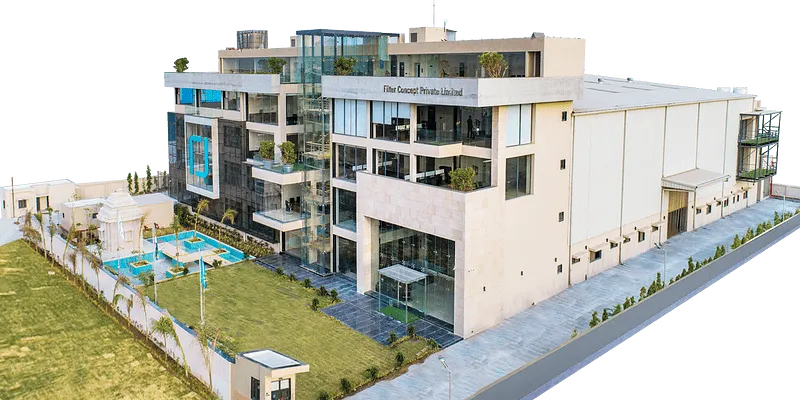This entrepreneur started a filter manufacturing business with Rs 10,000, sells to clients like ONGC, GAIL
Started in 2002 by Mehul Panchal, Filter Concept has around 10,000 products in its portfolio developed with in-house technologies. It offers services to industries, including oil and gas, petrochemicals, pharmaceuticals, steel and power, cement, formulations, fertilisers, textile, and others.
The Indian filtration market is somewhere between Rs 900 - 950 crore, says Mehul Panchal, Founder of .
In fact, the global market for industrial filtration is projected to reach $41.1 billion by 2025 from $29.5 billion in 2020, growing at a CAGR of 6.9 percent.
Filter Concept — a two-decade-old company — offers complete filtration technology solutions, catering to various filtration requirements of air, gas, and liquid for safe working conditions in the industrial infrastructure.
“When I started Filter Concept in 2002, at that time, the filtration business was confined to merely marketing and product selling to the industries, while application analysis was particularly at their lowest levels. Possessing a technical background, I was doing my own research, and the Filter Concept was born,” Mehul tells SMBStory.
A chemical engineer and an MBA by qualification, Mehul started the company in Ahmedabad, Gujarat, by investing Rs 10,000.
According to Mehul, Filter Concept raked in Rs 100 crore turnover in FY20. The company exports to 87 countries and earns 80 percent of its revenue from these exports and 20 percent from PSUs.
Setting up the business
Post his degree, Mehul wanted to set up a business where he could use his technical expertise. While doing some research he found some positive changes were necessary to implement in the filtration industry.
Hailing from Ahmedabad — an export hub for textile — Mehul first onboarded a dye and an intermediate segment company and supplied a Bag Filter System to them.
His first innings went well, which helped him to get more customers through word of mouth.
“I focussed on imparting knowledge by involving industries and designing filtration systems as per their specific requirements that helped companies and our business to be up on the game,” Mehul says.
Gradually, Mehul started approaching PSUs and bagged a deal with ONGC.
“We do not just sell a product. We understand the client’s demand, develop the product to solve their problem, and, I feel, that makes us unique. When I approached ONGC, I talked about the filtration concept before 50 people from higher management, and they were impressed,” Mehul narrates.

Filter Concept's manufacturing plant
The word-of-mouth marketing was nothing short of a chain reaction. ONGC referred the Filter Concept to GAIL, through which it was able to connect with IOCL and others.
At present, Filter Concept offers complete filtration technology solutions to clients across all industrial sectors, including oil and gas, petrochemicals, pharmaceuticals, steel and power, cement, formulations, fertilisers, textile, paints and inks, chemicals, mines and mineral, electronics, and water treatment, among others.
Creating an impact
Filter Concept builds its filtration machines based on its in-house technology and does not depend on other agencies for technological assistance.
The MSME has close to 10,000 products in broad categories like Filter Housings, Filter Consumables, Filter Bags (Liquid) Gas Filtration, and Air Filtration, among others in its portfolio. It has also developed around 100 technologies in-house.
Explaining one of the technologies, Mehul says, “One of our products — an automatic self-cleaning filter, having global patent — has delivered extraordinary results to the industry sector, where customers are not required to change their consumables.”
These filters are cleaned automatically once it tends to reach its preset differential pressure across the filter. The technology’s USP is that it doesn’t require any human intervention or filter replacement. In fact, it has benefited a lot of industries for routine filtration requirements, thereby saving on water and power consumption.
In fact, several industries produce high emissions that result in escalating pollution, which is not even in the 50-150 milligrams per normal cubic range defined by the Central Pollution Control Board, and, in turn, affect the environment.
“A few of our products are also instrumental in controlling the pollution, which other companies are emitting. These products help in lowering the emission output to less than 10 mg/Nm3. This standard is followed by American and European companies, and we are in that league as well,” Mehul says.
He adds that a lot of awareness and changes are yet to be brought in the filtration industry, and his company is on a mission to do that.
Challenges and the competition
Mehul says one of the major challenges for the industry as a whole is government support.
“We are an MSME. Though the government has taken a lot of steps to boost the sector, there are some infrastructural developments and schemes required to uplift it,” he highlights.
Talking about competition, Mehul says India has about 100 companies in the filtration industry.
But, “We do not see any competition as we are a solution provider for their filtration requirement. We are not a typical product selling company, which gives us an upper edge in comparison to our fellow competition of the same segment. Even we have faced our industry fellow mates having approached us for our technical expertise for offering the right product to their customer. Hence, this way, they too become our customer,” he adds.
In 2018, Filter Concept came up with air purifiers to cater to the retail market. Last year, its air purifiers’ sale grew 3 times due to the COVID-19 pandemic as people become aware of breathing good quality air.
The way ahead
Filter Concept is planning to launch hydrogel water purifier bottles into the B2C market soon. The company also aims to set up its offices and factories abroad.
“We have a clear-cut roadmap defined for our timelines. Preliminarily, we want to capture our potential market by establishing work stations across the globe,” Mehul says.
Edited by Suman Singh





1566906114227.png?mode=crop&crop=faces&ar=1%3A1&format=auto&w=1920&q=75)

